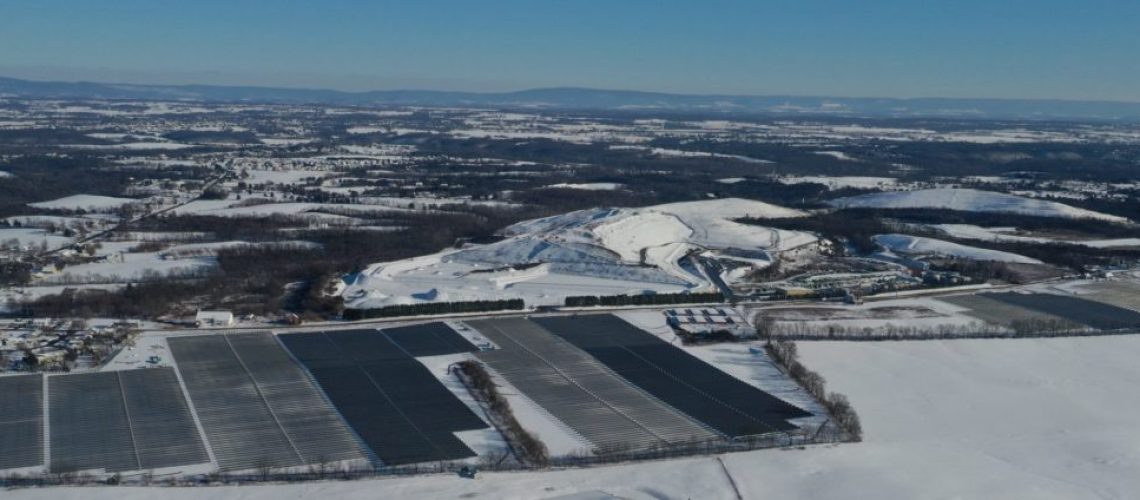The second solar project installation for SEPTA meets 20% of the transit authority’s electricity demand with clean power.
The Southeastern Pennsylvania Transportation Authority (SEPTA) announced the successful commercial scale operations of its second solar project built by Lightsource bp in Franklin County, Pennsylvania.
Located in Mercersburg, Pennsylvania, about 180 miles west of SEPTA’s downtown Philadelphia headquarters, the 25 MW Elk Hill Solar 1 farm is one of two utility-scale solar farms that the transit authority partnered with Lightsource to develop, bringing their joint statewide operational solar assets to 42 MW, enough clean energy to meet about 20% of SEPTA’s electricity demand.
Elk Hill Solar 1, developed under a power purchase agreement between SEPTA and Lightsource bp, will reduce greenhouse gas emissions by more than 28,000 metric tons of CO2 annually. The solar farm also supports Pennsylvania’s clean energy goals, helping to lower carbon emissions while diversifying the state’s energy portfolio and increasing energy security with locally generated electricity.
The Philadelphia metropolitan transit agency’s other solar project, 17.5 MW Elk Hill Solar 2, entered COD operations in February 2021. According to a Federal Energy Regulatory Commission notice from April, the Elk Hill solar projects went into operation out of order because Elk Hill Solar 1 was being investigated under Sec. 206 of the Federal Power Act for potential rate schedule irregularities.
Elk Hill Solar 1 was fully funded by Lightsource bp and project investors with an estimated $25 million investment into the state’s energy infrastructure. The project also created 100 jobs during the construction of the facility.
Under a biodiversity and land management action plan, Elk Hill Solar 1 was installed to maximize sustainability benefits through an agrivoltaic habitat creation and co-located agriculture to farm the land while also harnessing solar energy.
Land under and around solar panels will be planted with groundcover that is grazing and pollinator friendly, including native wildflowers and clover species. Lightsource bp is working with a local farmer on a plan to graze sheep to manage the vegetation around the Elk Hill project.
In April 2020, SEPTA released a broad sustainability report called the ‘SEP-TAINABLE Annual Report for 2020’ which outlined the Philadelphia regional transit authority’s long-term climate change reduction goals. Initiatives the authority has undertaken include:
- Signing virtual power purchase agreements for 35 MW of solar power to be developed in Franklin County, PA.
- Commissioning two rooftop solar power installations, generating more than 500 MWh of clean energy to date.
- Introduction of 25 battery electric (EV) buses, one of the largest such zero-emission transit fleets in the United States.
- Progress on building energy efficiency retrofit of SEPTA’s headquarters.
- Completion of an eight-acre stormwater management project, nearly doubling SEPTA’s acreage of greened property.
- Recertification of two maintenance facilities under ISO 14001 standard for environmental management.
- Hosting of farmers markets at eight SEPTA properties to improve availability of fresh, healthy food to service communities.
SEPTA is planning for a full transition to zero-emission buses (ZEBs) by 2040 and during its 2020 sustainability plan briefing outlined a master plan to spend $1.09 billion on future bus purchases from 2022 to 2033. The first phase calls for hybrid buses through 2024, with the second phase from 2024 onwards calling for electric and fuel cell electric buses.
Progress on the authority’s switch to battery electric buses was marred by public media station WHYY reports in mid-2021 of SEPTA sidelining a 25-bus fleet of Proterra all-electric vehicles due to an alleged cracked chassis defect.
In February 2022, SEPTA signed an order with Canadian bus manufacturer New Flyer of America for 220 Xcelsior hybrid electric buses.
A hotbed for natural gas with 21.8% of the nation’s gas reserves lying underground according to the Energy Information Administration (EIA), Pennsylvania currently ranks 24th in the country for solar development, with 1 GW of installations through September 30. According to the Solar Energy Industries Association (SEIA), the Keystone State ranks 14th in the U.S. based on its robust 3.09 GW development pipeline for the next five years.




